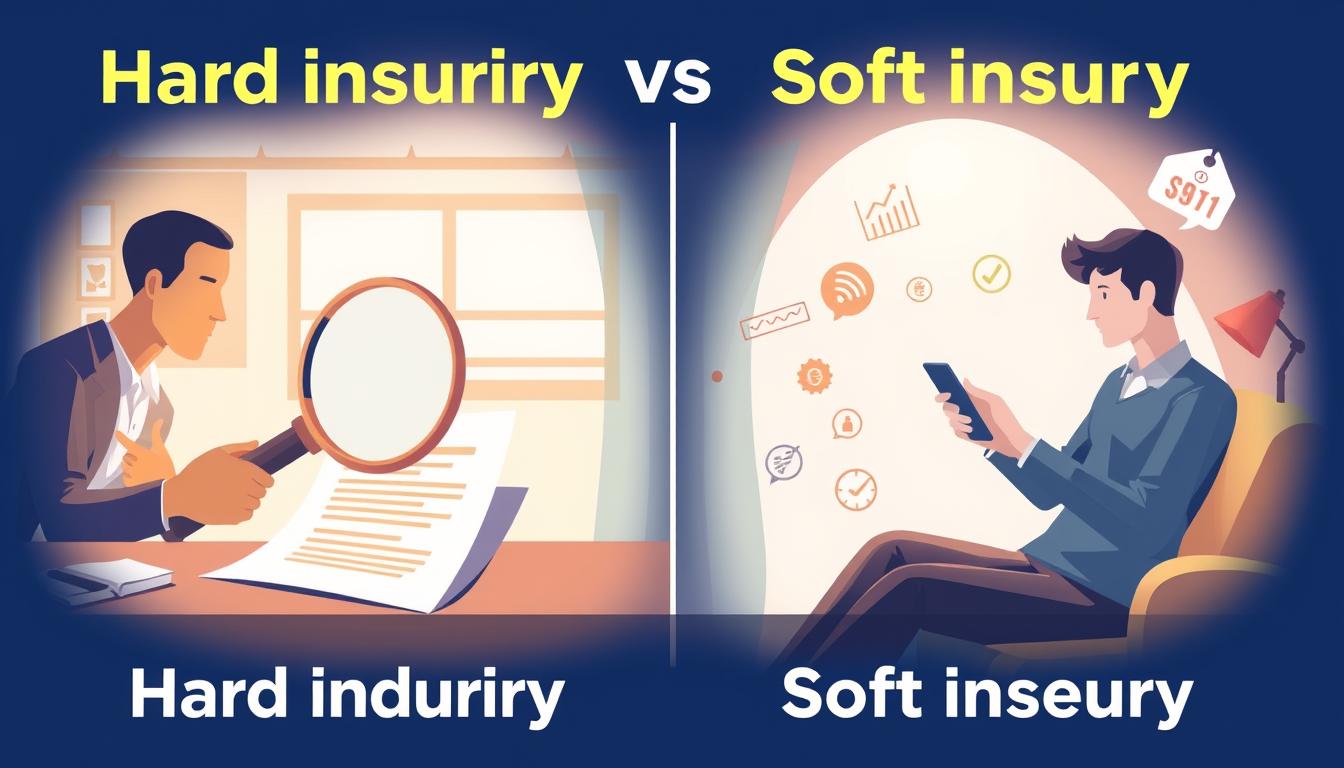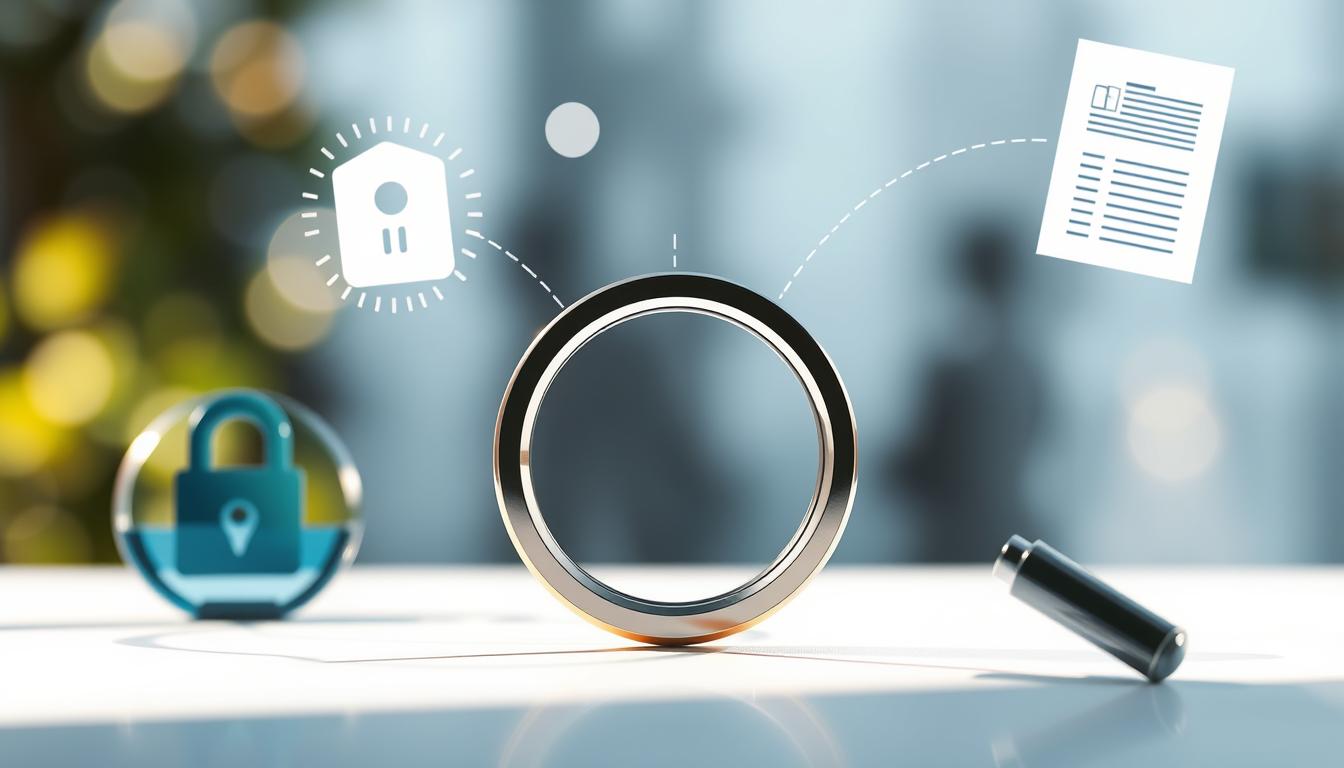Understanding credit reports is vital for managing personal finances. A court soft inquiry is a key aspect many people misunderstand. Let’s explore this topic in depth.
We’ll look at the differences between hard and soft inquiries. We’ll also examine how they affect credit scores. Finally, we’ll discuss the allowed reasons for these soft inquiries.
Key Takeaways
- Court soft inquiries on credit reports are a type of soft credit check that do not impact your credit score.
- Soft inquiries are permissible for pre-approved credit offers, credit monitoring services, and certain employment and tenant screening purposes.
- The Fair Credit Reporting Act (FCRA) outlines the guidelines for permissible soft inquiries, protecting consumer credit information.
- Monitoring your credit report regularly can help you identify and understand any soft inquiries made on your credit history.
- Maintaining a good credit profile and understanding the various types of credit checks can help you make informed financial decisions.
Understanding Credit Inquiries
Credit inquiries play a crucial role in lending. They help lenders assess your creditworthiness. There are two types: hard inquiries and soft inquiries.
Each type affects your credit score differently. Understanding these differences can help you manage your credit better.
Hard vs. Soft Inquiries
Hard inquiries happen when you apply for new credit. This includes credit cards, loans, or mortgages. They appear on your credit report.
Soft inquiries occur during pre-approvals or account monitoring. Lenders use them to check your credit. These don’t affect your credit score.
Impact on Credit Scores
Hard inquiries can lower your score by a few points. They stay on your report for up to two years. The impact is usually less than five points.
Soft inquiries don’t affect your credit score. They’re not visible to lenders. You can have many soft inquiries without worry.
| Hard Inquiries | Soft Inquiries |
|---|---|
| Occur when you apply for new credit | Occur for account monitoring or pre-approvals |
| Can temporarily lower your credit score | Have no impact on your credit score |
| Remain on your credit report for up to 2 years | Are not visible to lenders |
Knowing about hard and soft inquiries helps you make smart credit decisions. It allows you to protect your financial health. You can better manage your credit with this knowledge.

What is a Court Soft Inquiry on Credit Report?
A court soft inquiry is a special credit check done by the court system. It doesn’t affect your credit score like hard inquiries do. These subtle checks leave a record on your credit report.
Courts use soft inquiries for specific legal and regulatory reasons. They might review pre-approved credit offers or conduct screenings. These checks ensure law compliance and protect consumers and lenders.

Court soft inquiries differ from regular soft checks by lenders or credit card companies. They serve a unique legal function in credit reporting. Understanding these inquiries helps you navigate credit reporting complexities.
“Court soft inquiries on credit reports are a unique tool used by the justice system to maintain the integrity of the credit reporting process, while also protecting the rights of consumers.”
Knowing about court soft inquiries helps you understand credit reporting better. It ensures your financial info is used correctly for permissible purposes. Stay informed to protect your credit rights.
Permissible Purposes for Soft Inquiries
The Fair Credit Reporting Act (FCRA) sets rules for soft inquiries on credit reports. These inquiries don’t affect your credit score. They’re used for pre-approved offers and credit monitoring.
Pre-Approved Credit Offers
Lenders can check your credit to make pre-approved offers. This is allowed by the FCRA. It helps companies create personalized financing options for you.
These checks don’t harm your credit score. They let lenders see if you might qualify for their products.
Credit Monitoring Services
Credit monitoring services also use soft inquiries. These services review your credit reports regularly. They alert you to changes or signs of identity theft.
You can join these programs to keep track of your credit. They help you protect your financial health.
Knowing about FCRA-allowed soft inquiries can boost your confidence. It helps you understand how these checks affect your credit profile.

Employment Screening and Tenant Screening
Your credit history might be checked when applying for jobs or homes. Employers and landlords use employment screening credit checks and tenant screening credit reports. These checks help assess your creditworthiness and financial responsibility.
The Fair Credit Reporting Act (FCRA) classifies these checks as “soft inquiries”. They don’t affect your credit score but appear on your credit report. This info helps employers and landlords make informed decisions.
Employer Screening
Many employers check credit as part of hiring. They look at financial stability, decision-making skills, and trustworthiness. These soft inquiries don’t impact your credit score.
Tenant Screening
Landlords often review credit reports before renting. They want to know if you pay bills on time. They also check how well you manage your finances.
| Screening Type | Purpose | Impact on Credit Score |
|---|---|---|
| Employment Screening Credit Checks | Evaluate financial stability, decision-making, and trustworthiness | No impact |
| Tenant Screening Credit Reports | Assess risk of renting to applicant | No impact |
Soft inquiries don’t affect your credit score but show on your report. Keep a good credit history to help with job and rental applications.

court soft inquiry on credit report
A court soft inquiry is a type of credit check by the court system. It’s used for pre-approved credit offers or employment screening. These inquiries don’t affect your credit score but appear on your report.
Court soft inquiries are started by the legal system, not you or a lender. The court can access your credit info without your consent. This is allowed under the Fair Credit Reporting Act (FCRA).
These inquiries differ from the common soft pull credit inquiry you might do yourself. Understanding credit report soft inquiries helps you manage your credit history better. It also ensures your rights are protected.
The court uses soft inquiries for various legal matters. These can include:
- Determining eligibility for court-ordered pre-approved credit offers
- Evaluating financial circumstances during divorce or bankruptcy proceedings
- Assessing an individual’s suitability for employment or housing in certain cases
Knowing about court soft inquiries helps you prepare for credit-related legal matters. Stay informed about your credit report. This will help you control your financial well-being.
Fair Credit Reporting Act (FCRA) Guidelines
The Fair Credit Reporting Act (FCRA) sets rules for credit checks. It protects consumers’ privacy and ensures fair credit reporting. This federal law covers both hard and soft inquiries.
Permissible Soft Inquiries Under FCRA
The FCRA allows soft inquiries in specific situations. These FCRA permissible soft inquiries don’t impact credit scores.
- Pre-approved credit offers: Lenders can pre-screen consumers for credit cards or loans. This helps them assess eligibility without affecting credit scores.
- Credit monitoring services: Consumers can allow companies to review their credit reports regularly. These checks are soft inquiries.
- Employment and tenant screening: Employers and landlords may check applicants’ creditworthiness. They must inform applicants about these soft inquiries.
The Fair Credit Reporting Act guides permissible purpose credit checks. It ensures responsible use of consumers’ credit information.
These guidelines protect people’s financial well-being. They promote fair practices in credit reporting and access.
“The FCRA is a critical law that safeguards consumers’ credit information and ensures fair and transparent credit reporting practices.”
Recognizing Soft Inquiries on Credit Reports
Your credit report contains both hard and soft inquiries. Hard inquiries can impact your credit score. Soft inquiries are less visible but still important to recognize.
A court soft inquiry is one type of soft inquiry. It happens when a court or legal entity checks your credit info for specific purposes.
These purposes may include evaluating your creditworthiness for a loan or rental application. Court soft inquiries don’t directly affect your credit score.
- Court soft inquiries are typically associated with legal proceedings and do not directly affect your credit score.
- These inquiries are often related to background checks, employment screenings, or landlord-tenant disputes.
- It’s important to understand the definition of credit report soft inquiries and how they differ from hard inquiries, which can have a more significant impact on your credit score.
Knowing the types of soft pull credit inquiries helps you understand your financial standing. It also helps identify potential issues that may need further investigation.
“Keeping track of the soft inquiries on your credit report can help you stay informed about the parties accessing your credit information and ensure that your rights are being protected.”
Protecting Your Credit Information
Keeping your credit information safe is vital in our digital world. Regularly check your credit reports to spot any issues. This helps you catch unauthorized inquiries and other problems quickly.
Monitoring Credit Reports
Credit monitoring services can help you watch your credit history closely. They often alert you about changes to your credit profile. This includes new soft inquiries on your report.
You can get a free yearly credit report from Experian, Equifax, and TransUnion. Use these to check for any suspicious activity on your records.
If you find unauthorized soft inquiries, you can dispute them. Contact the credit reporting agencies to investigate and remove these entries. This protects your credit information’s accuracy.

